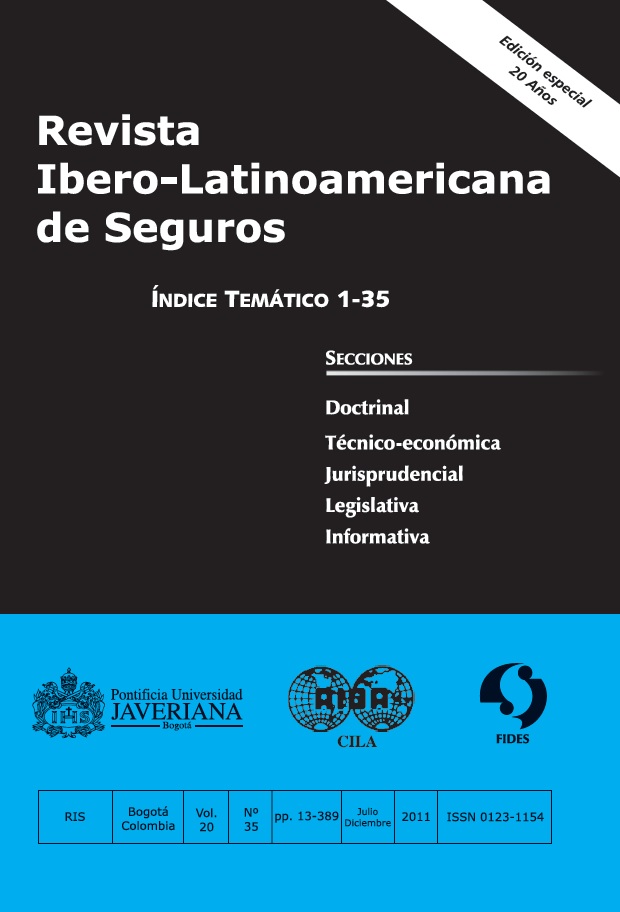Abstract
This article will focus on the most significant and controversial moot points of this system called ‘extraordinary’ or ‘non-conventional,’ more specifically, the scheme known under the English denomination as ‘claims made,’ which apart from existing next to the traditional or ordinary one, has not been widely accepted and has ended adjusting itself to reflect somehow the legal situation, although not with the acceptance and applause from the ‘communis opinio’, precisely because of its restrictive features, aspect that will be examined throughout this article. Nonetheless, such is the turn of events that have resulted from the incorporation of the mentioned system and therefore it is not possible to successfully accept, with absolute coherence and good judgment the full and undisputable validity of each and every one of the past discussions, because it needs to be acknowledged, whether we like it or not, that its architecture or morphology is diverse, as the claim, in fact, will become its actual epicenter, a fact that is not exempt from relevant changes in the legal, technical and economic fields of the insurance policy. Therefore it would not
be possible, plainly put, to approach the institution only through the explained theses, which need to be analyzed, compared and received with some adjustments and with some degree of explanation, because its incorporation, if made lightly, would entail distortions and will result in rather conceptual difficulties. That is the reason why it is required to start upon a changing reality, a sort of campus novum in order to not destroy stances that were built over rather several bases: the occurrence basis or the traditional one, full of particularities that call for them to be substantive to the point that when they were structured the prevailing scheme was another one; insuring with this type of claim made clauses was not even remotely thought. Hence and by using an example, it can be said that when in Colombia the losses topic was tackled in 1990 within the civil liability insurance policy (loss, Art. 1131 of the Commercial Code), no contemplation and therefore no regulation of the already mentioned system (occurrence) other than the traditional or ordinary one was
evidenced, which explains its introduction seven years later (Law 389 of 1997, art. 4) and that resulted in the inapplicability of the cited Article 1131 of the Commercial Code, adopted in totally diverse conditions, holding therefore an “ideological bias” with all its implications.
We witness therefore another dimension, we are in another field, even if we
have the inclination to apply to this new feature, what for decades has explained and supported a determined institution. It is therefore not strange that what in a certain system is fully received, in the remaining one such circumstance does not occur, precisely because of its anatomy, in itself diverse. Therein lies the main feature of the loss in one and another system, in our opinion, non-symmetrical ones, as said below. Obviously all opinions to the contrary are welcomed, but it is advisable not to perform a sort of transplant as a whole, thereby forgetting the origin of the change, its meaning and basis, which was not formal, nominal or just in style; only if there’s authentic awareness about the change introduced, such can be fully assimilated. Otherwise, a systemic contamination process will take place and it will trigger an incompatible institution that groups two systems which are in fact different, which motivates a panoramic study of the one commonly known as claims made, something that we will conduct below.
This journal is registered under a Creative Commons Attribution 4.0 International Public License. Thus, this work may be reproduced, distributed, and publicly shared in digital format, as long as the names of the authors and Pontificia Universidad Javeriana are acknowledged. Others are allowed to quote, adapt, transform, auto-archive, republish, and create based on this material, for any purpose (even commercial ones), provided the authorship is duly acknowledged, a link to the original work is provided, and it is specified if changes have been made. Pontificia Universidad Javeriana does not hold the rights of published works and the authors are solely responsible for the contents of their works; they keep the moral, intellectual, privacy, and publicity rights.
Approving the intervention of the work (review, copy-editing, translation, layout) and the following outreach, are granted through an use license and not through an assignment of rights. This means the journal and Pontificia Universidad Javeriana cannot be held responsible for any ethical malpractice by the authors. As a consequence of the protection granted by the use license, the journal is not required to publish recantations or modify information already published, unless the errata stems from the editorial management process. Publishing contents in this journal does not generate royalties for contributors.


